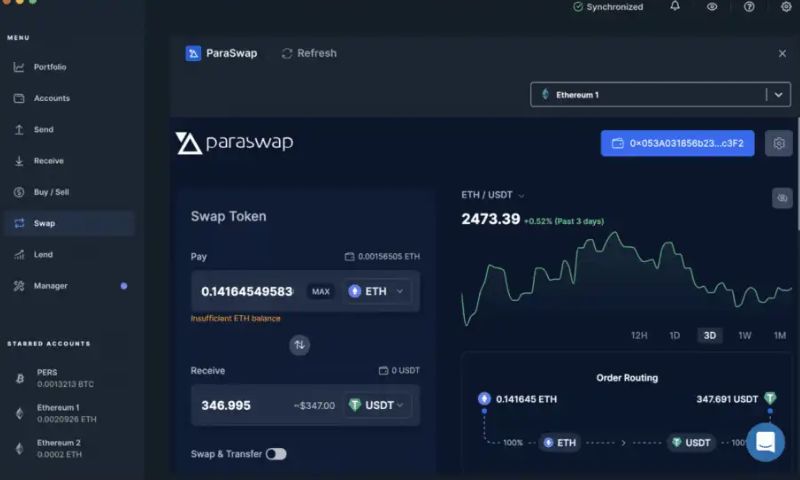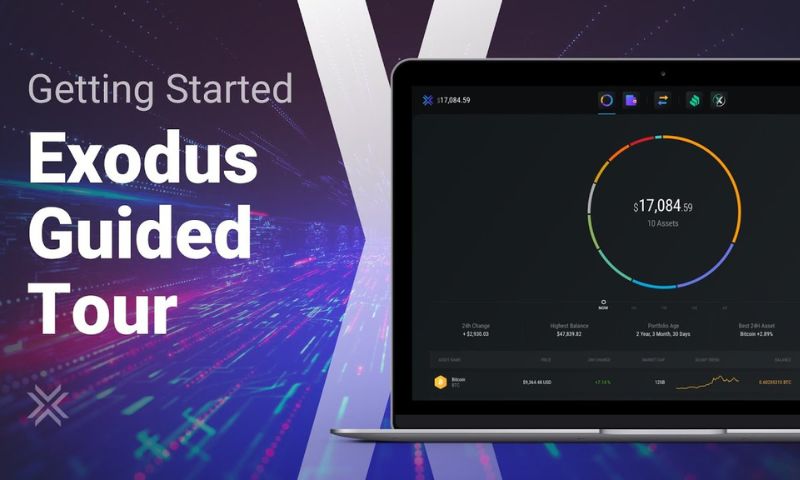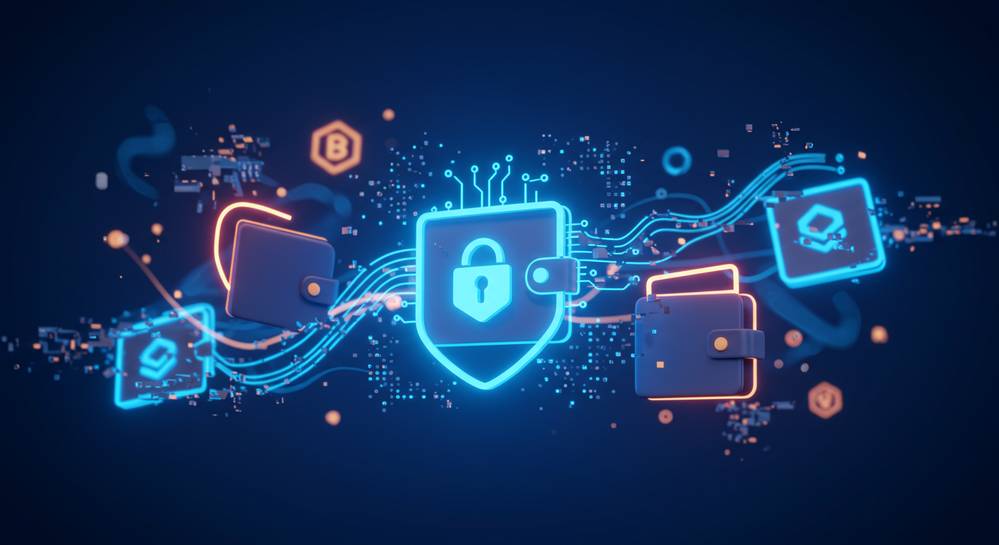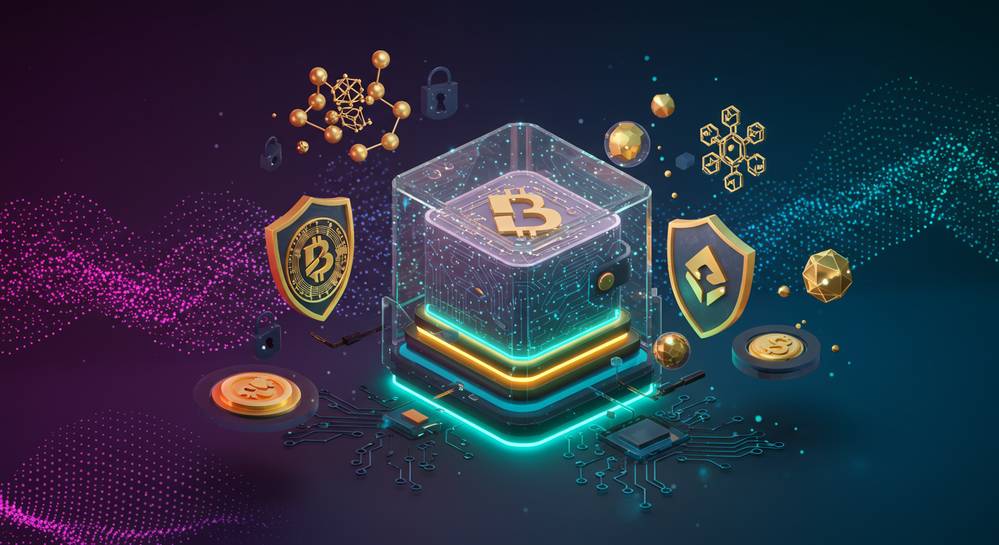Most secure desktop crypto wallets don’t just happen; they’re a choice — yours. Your peace of mind hinges on your wallet’s fortress-like security. Imagine placing your digital treasures somewhere with bolted doors and vigilant guards. It’s more than encryption; it’s about trust and empowerment. Here, I’ll unlock the ultimate protection secrets for your crypto assets. From the lattice of wallet types to the shield of advanced features, you’ll learn to pick treasures that defy digital threats. Dive in, as we dissect cold storage principles and hot wallets, ensuring your crypto journey’s safe and sound. Let’s get that crypto vault as unbreakable as can be.
Understanding the Landscape of Desktop Wallet Security
The Key Differences Between Hardware and Software Wallets
When you’re storing digital coins, picking the right wallet is key. Hardware wallets, like USB devices, keep your crypto offline. This is called cold storage. They’re safe from online hackers and great for long-term holding. But they cost money and are less handy for quick trades.
Software wallets are apps on your computer. They’re free and easy for daily use. Yet they are riskier, as they’re connected to the internet—this is what we mean by hot wallets. Hardware wallets beat software ones in security but lack quick access.
Let’s get this clear: both wallet types can have solid security. But how they face risks differs a lot. Hardware wallets stand strong against digital threats. Software wallets, though, need extra caution from users to prevent hacks.
The Principles of Cold Storage and Hot Wallets
Cold storage refers to keeping crypto offline and safe from internet thieves. It’s like a safe for your digital money. Think of it as your savings account, not easy to dip into but very secure.
Hot wallets are connected to the web. They’re like checking accounts for daily expenses, easier to reach but less protected. Skilled users can keep hot wallets secure with good habits and care.
While cold storage is safer, it’s not quick to use. Hot wallets let you buy and sell fast but need you to be on guard. In both cases, private key protection is a must. Never share your private key; it’s the “password” to your coins.
Using multisignature wallets adds a layer of security, needing more than one key to open. For two-factor authentication, you use a second check, like a text or email code, to enter your wallet. Both are smart moves for any crypto holder.
There’s a jungle of wallets out there. My advice? Check desktop wallet security features. Look into backup protocols too. Make sure to review user experiences and dig deep.
Remember, keeping your crypto secure is a big deal, and your wallet choice plays a huge part in it. Choose wisely, and prioritize safety every step of the way.

Evaluating Top Secure Desktop Cryptocurrency Wallets
Features to Look for in Encrypted Digital Currency Wallets
When you choose a wallet for your crypto, think safety first. Desktop wallets are programs you can install on your computer. They store your crypto offline most times, which helps keep it safe. Look for ones with strong wallet encryption methods. This keeps your coins safe from hackers. Go for wallets that need more than one key to send money, which are called multisignature wallets. This means even if someone gets one key, they can’t take your coins. Most good wallets will ask you to write down a seed phrase. This is a list of words that can help you get your coins back if there’s a problem. Also, keep an eye out for wallets where you can use two-factor authentication. This is where you use another device, like your phone, to make sure it’s really you.
Case Studies: Top-Rated Cryptocurrency Wallet Reviews
Looking at the pros and cons of desktop wallets can show why some are trusted. The Ledger Live desktop app is known for being secure and easy. It lets you check your balance and send and receive different kinds of crypto. Trezor has an interface that’s also easy to use and helps users safely manage their coins. Then there’s Atomic Wallet, which is liked because it supports lots of coins. It also lets you buy crypto with a bank card. Exodus wallet is all about making things simple for its users. Plus, it pairs with the Trezor hardware wallet for added security. Electrum wallet is for Bitcoin lovers and has been around a long time, showing it’s reliable.
Each of these wallets focuses on keeping your private keys safe. They don’t let them leave your computer. This is key for protecting your money. They also all make sure that if something bad does happen, like if your computer breaks, there’s a way to get your coins back. That’s why having a good recovery plan for your desktop wallet is super important. These wallets also guard against crypto wallet phishing. This is when tricksters try to steal your personal info. They have ways to help you spot these scams and stay safe.
When you read about crypto wallet hacking incidents, think about how these wallets work to stop them. They always update their security to deal with new threats. Reviews of these wallets often talk about these updates and how they keep users safe. Security audits are a big deal too. This is when experts check to see if the wallets are as safe as they say. You want a wallet that’s been checked out and approved.
Choosing the right desktop wallet means looking at your needs and picking the best tools to protect your crypto. Make sure to read lots of reviews and check the wallet’s features. Remember, the best wallet keeps your coins safe and is easy for you to use!
Advanced Security Features and User Accessibility
The Role of Multi-Signature and Two-Factor Authentication
Multi-signature, or multisig, means many folks must okay a crypto deal. It’s like a bank vault that needs many keys to open. This keeps your coins safe if one key gets lost or stolen. With multisig, a hacker needs more than one key, making it much harder to steal your crypto. This feature is crucial in business or group settings where more than one person should agree on transactions.
Two-factor authentication (2FA) adds another layer to your wallet’s defense. It asks for a second proof, like a text or email code, before you can get in or send money. It stops folks who may know your password from getting into your wallet. Always turn on 2FA for an extra shield against unwanted access.
User-Friendly Aspect Versus Security: Striking the Right Balance
Finding the middle ground between easy use and tight security is key. Yes, a wallet must be safe. But if it’s too hard to use, it’s not helpful. Look for wallets that keep your coins safe and make sending and receiving crypto easy. A great wallet gives clear steps and keeps things simple, even when the tech behind it is complex.
User-friendly crypto wallets should guide you, especially during setup and backup. They should clearly explain how to protect and recover your assets—a must-have for any user. But easy doesn’t mean less safe. The best desktop wallet for crypto finds a blend of these traits, never trading off security for ease of use. They ensure your peace of mind, allowing you to manage various cryptocurrencies confidently.
Remember, good wallets teach you their features without confusion. They also continually update to stay ahead in safety and support. This is a sign of a trustworthy and secure wallet. Your focus should be on what matters: your crypto’s growth and overall market movements, not stressing over wallet security.
URLOPTIMIZED
In summary, go for wallets that balance security and user-friendliness. Aim for multi-signature and two-factor authentication to protect your funds. And always choose a wallet that aligns with your crypto needs while keeping your assets locked tight.

Maintenance and Recovery: Safeguarding Your Crypto Assets
Implementing and Testing Desktop Wallet Backup Protocols
Keeping your crypto safe is like guarding a treasure. It’s vital and serious. For top security, backups are must-dos. Backups copy your wallet’s info. They help if your computer breaks or gets stolen. Use backup protocols for your wallet to prepare.
When you back up your wallet, you make copies of private keys. These keys let you control your crypto. Without them, you’re locked out. So, save them in multiple secure places. Not just on your computer. Think USB drives and even paper. Just keep it safe from fire, water, and prying eyes.
Test backups often. Why? To be sure they work when you need them. Check if you can restore your wallet from the backup without a hitch. If not, fix it right away. Don’t wait. Testing restores trust and peace of mind.
Let’s talk about encrypted digital currency wallets. They scramble your data. This keeps hackers clueless. To encrypt, you’ll need a strong password. Think of a password as a secret handshake to your digital vault. It should be hard to guess.
Designing a Recovery Plan for Your Desktop Wallet
Now, onto recovery plans. They’re your plan B when things go south. Say your computer dies or your wallet app fails. With a recovery plan, you bounce back. It’s that simple. It’s all about being ready for the worst.
For a good plan, write down your wallet’s seed phrase. A seed phrase is a super password. It brings your wallet back to life. So, write it down. Keep it like gold. If you lose it, you’re out of luck. No seed phrase, no crypto.
Use multisignature wallets for even better safety. Multisig means more than one key. It’s like needing two keys to open a bank vault. More keys mean fewer chances for theft. It’s teamwork for your wallet’s security.
Even the best desktop wallet for crypto needs a recovery plan. That’s because stuff happens. Tech fails, people make mistakes, thieves try to steal. With a plan, you’re ready. You face less risk of losing your crypto.
Store your backup and seed phrase apart. Far apart. If one spot is in danger, the other is safe. This way, you’re never stuck and safe from loss.
Keep in mind, hardware versus software wallets have different needs. Hardware wallets, like USB keys, are easy to back up. Just copy the seed phrase. For software ones, you’ll use the app’s backup methods.
To wrap it up, always watch your security. New threats emerge all the time. Update your recovery plan as needed. With these steps, you lock down your crypto like a fortress. You’ll rest easy knowing your digital treasure is secure.
We looked at desktop wallet security, noting key points like hardware versus software wallets and cold versus hot storage methods. Understanding these basics helps you pick a wallet that fits your needs. We also went through top wallets, their security features, and user reviews to give you real-life insights.
Remember, a balance between ease of use and tight security is crucial. Features like multi-signature and two-factor authentication boost safety. Don’t forget about making a solid backup and recovery plan to protect your crypto.
Stay safe and keep learning to manage your digital funds wisely!
Q&A :
#### What are the top features to look for in a secure desktop crypto wallet?
When choosing a desktop crypto wallet, security is paramount. Look for features like multi-signature support, which requires consent from multiple devices before transactions are authorized. Two-factor authentication (2FA), which adds an extra layer of security beyond just a password, is also a must. Another key feature is hierarchical deterministic (HD) support that ensures you can recover your funds with a seed phrase if your computer crashes or your wallet is lost. Lastly, open-source software can provide an added layer of trust, as it allows the community to review the wallet's code for security and integrity.
#### How do secure desktop crypto wallets protect private keys?
Secure desktop crypto wallets often encrypt the user's private keys on their local device, shielding the keys from online theft. Many wallets implement hardware-level security such as Trusted Platform Module (TPM) or Secure Elements (SE) to protect the keys, even if the computer was compromised. They also commonly have a strong password requirement and automatic lockouts after multiple failed access attempts to prevent brute-force attacks. Furthermore, some wallets may offer the ability for the private keys to never leave the device when signing transactions.
#### Can desktop crypto wallets be hacked, and how can you prevent it?
While desktop crypto wallets are generally safe, they are not immune to all types of hacking. To reduce the risk, one should take several measures. Always keep the wallet software up to date to mitigate the risk of security vulnerabilities. Use comprehensive antivirus and firewall protection to safeguard against malware and phishing. Never share your seed phrase or private keys, and double-check receiving addresses. Consider using a dedicated, clean computer for your crypto activities or a bootable USB drive for an extra security layer.
#### What are the best practices for backing up a desktop crypto wallet?
Backing up your desktop crypto wallet is critical in case of device failure or theft. The best practice includes writing down the seed phrase, ideally a 12-24 word recovery phrase provided when you set up your wallet, and storing it securely in multiple physical locations, like a bank vault or a safe. It is also wise to create encrypted digital backups of your wallet files and store them on different devices like external hard drives or secure cloud services. Remember to test your backups regularly to ensure they work when needed.
#### Are there any secure desktop crypto wallets that are free to use?
Yes, many secure desktop crypto wallets are available for free. Wallets like Electrum, Exodus, and Atomic Wallet offer robust security features without charging users. Keep in mind that while the wallet software may be free, transactions themselves might involve network fees that go to miners or validators, not the wallet's developers. Always research and select a wallet that not only fits your security needs but also has a solid reputation in the crypto community.



